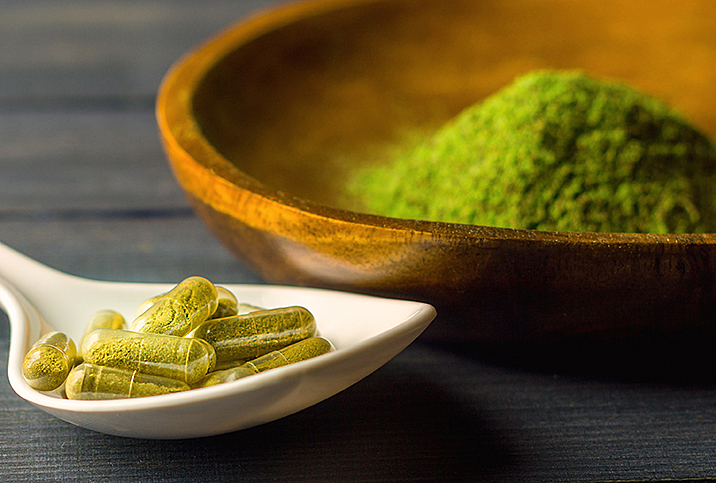Kratom Can Help Ease Chronic Pain, but Is It Safe?

Eleven years ago, severe pain struck Lora Romney's face like lightning. The Utah real estate accountant was diagnosed with atypical trigeminal neuralgia, an incurable nerve condition that causes shooting, burning and tingling sensations in the face.
Romney was prescribed gabapentin, an anticonvulsant that is often used to treat nerve pain and is labeled a controlled substance in several states. It worked, but the medicine's effects lasted only four to five hours and she was restricted to two pills per day.
"I was just dying with pain here and they're like, 'No, we don't want to give you more,'" she said.
A friend who also had the condition recommended kratom, a traditional remedy made from the leaves of the Mitragyna speciosa tree, native to Southeast Asia.
"When I tried it, I just couldn't believe that within 20 minutes, my pain had dropped. At first, I thought it was just a coincidence because pain goes up and down. But after a week, I realized, my God, this is really consistent," Romney said.
Her doctor was pleased that she needed only one pill per day, until Romney told her why. She was given an ultimatum: no more kratom or no more gabapentin. Romney decided she'd rather have consistent relief, even if she had to tough it out through bad flares.
"The doctor said I'd be back, but I never did," Romney said.
The controversy surrounding kratom
The Food and Drug Administration (FDA) has been issuing warnings about kratom since it began appearing on U.S. shores in the 2000s. In response to a request for an interview, the FDA sent a statement explaining its extreme caution regarding the plant. Chemical dependence is the FDA's primary concern. Although kratom is not an opioid, it binds to the same brain receptors, causing euphoria or stimulation. According to the FDA, it doesn't have medical benefits.
Oliver Grundmann, Ph.D., clinical professor of pharmacology at the University of Florida, understands the FDA's caution.
"The FDA bases their assessment solely on how alkaloids bind to opioid receptors, and we already have an opioid crisis. Their reasoning from a public health policy perspective is that it is important that patients and consumers are kept safe," he said.
Although kratom is not an opioid, it binds to the same brain receptors, causing euphoria or stimulation.
Based on its own research, the National Institute on Drug Abuse (NIDA), under the National Institutes of Health (NIH), has come to a different conclusion from the FDA: "Studies in animal models suggest kratom and related compounds potentially have other therapeutic properties, such as antidepressant and pain-relieving properties, that may warrant further study."
However, the institute also notes that kratom has not been proven safe or effective in the United States for any medical purpose.
The NIDA/NIH researchers also found kratom to be much safer than a Google search would lead you to believe. Deaths related to kratom are extremely rare, especially compared with opioids: 11, compared with more than 200,000, from 2011 to 2017.
A 2020 survey of recovering opiate addicts, conducted by Johns Hopkins University, suggests kratom could help, rather than exacerbate, the opioid crisis. Eighty-seven percent of adult participants who replaced opiates with kratom reported a significant lessening of withdrawal symptoms using kratom. Thirty-five percent were opioid-free within a year. Dependence on kratom was found to be similar to caffeine: 10 percent of subjects became irritable, depressed or anxious when they stopped using it.
Chronic pain negatively affects sexual health
Many kratom users, like Romney, take the substance to deal with chronic pain. Chronic pain can come from a variety of sources—such as inflammation and dysfunctional nerves—and more than 3 million people in the U.S. suffer each year, according to Mayo Clinic.
The impacts of chronic pain reverberate much further than just physical symptoms, often causing a loss of libido or sex drive, increased performance anxiety and decreased sexual enjoyment.
While some kratom users may find their libido increases as their pain reduces, kratom may have other sexual benefits as well. Men in Malaysia who used kratom daily and long term reported improved sexual functioning, according to a 2020 study published in the Journal of Herbal Medicine. The surveyed men reported more energy during sex, delayed ejaculation, help with maintaining an erection, longer climax, increased sexual desire and reduced sex organ sensitivity.
There are anecdotal reports of kratom causing erectile dysfunction (ED) in some men, but more research is needed in this area.
Kratom: The new medical marijuana?
The tide has been turning on kratom in recent years. In 2016, stories like Romney's helped compel 51 members of the U.S. House of Representatives—26 Republicans and 25 Democrats—along with 11 senators, including Orrin Hatch, R-Utah, and Bernie Sanders, I-Vt., to stop efforts by the Drug Enforcement Agency (DEA) to classify kratom as a Schedule I controlled substance—the most restrictive category, which includes heroin and LSD. The efforts of Congress worked, and the DEA withdrew its notice of intent regarding kratom's classification.
However, some individual states, including Alabama, Arkansas, Indiana, Rhode Island, Vermont and Wisconsin, have passed laws that make kratom illegal within their borders, according to a 2021 report by Politico. Other states, including Arizona and Utah, have passed laws, such as the Kratom Consumer Protection Act, to regulate the product.
Mac Haddow, senior fellow on public policy for the American Kratom Association, a consumer protection nonprofit group, is hopeful about kratom's future. Haddow began his advocacy for natural medicine under Hatch, who introduced the Dietary Supplement Health and Education Act of 1994. Haddow was also the chief of staff of the Department of Health and Human Services (HHS) under the Reagan administration and ran Hatch's Senate campaign in 1976.
"We're working hard to show with good science, new science, credible science, that kratom is, in fact, a substance that can be used by people safely and responsibly, that it is not dangerously addictive. The good news is that things are changing," Haddow said, citing a recent letter sent from Health and Human Services Secretary Xavier Becerra to Sen. Mike Lee, R-Utah, and Rep. Mark Pocan, D-Wis.
The March 16 letter states that HHS, the NIH and the FDA are "supporting studies on the pharmacology of kratom's constituents, their toxicity and addictive liability, as well as their potential therapeutic benefits for pain and substance use disorder."
Red or green light? At this point, yellow
Grundmann agrees with the World Health Organization's 2021 decision to continue monitoring kratom but not ban it.
"I remain in favor of keeping kratom legal with the caveat that it should be adequately regulated according to labeling and GMP [good manufacturing practices]," he said.
Grundmann came to this conclusion after conducting a survey of 15,000 kratom users, finding only 1 percent needed hospitalization related to kratom use. Some people used it to get off opiates, but the majority used small doses a few times a day for either emotional or mental disorders or chronic pain.
The dangers lie in processing and testing, Grundmann said, and consumers should avoid tinctures or capsules sold at gas stations or convenience stores. While the internet may seem like a safer alternative for purchase, it's important to remember that kratom is not federally regulated, which means no government body verifies the quality or safety of the product.
The dangers lie in processing and testing, and consumers should avoid tinctures or capsules sold at gas stations or convenience stores.
"Some manufacturers will extract from the leaf and create a concentrate powder to increase the mitragynine," Grundmann explained. "I don't advocate for that because it might have different effects from the actual native leaf material. That is where we might expect to see potential adverse effects, potential of dependence development, if that 7-Hydroxymitragynine content in the leaf material is not kept below a certain threshold."
Manufacturers also need to test for E. coli and heavy metals, he said.
"There was an E. coli and salmonella contamination. FDA raised concern that heavy metals like arsenic and lead are relatively high in certain kratom products. They need to meet the food thresholds for daily ingestion," Grundmann warned.
The American Kratom Association lists vendors who have agreed to maintain standards of safety.
Pain sufferers advocate for kratom
Four and a half years later, Romney is on the same kratom dose she started with—rarely the case with opiates—and her new doctor is fine with supplementing her with pharmaceuticals. She takes one opiate every 10 days or so when she has excruciating pain, but most of the time, the pain is at a functional level of 2 to 4 instead of a 9. For someone with chronic pain, she said, that is life-changing.
She has become an advocate, pushing for more states to adopt the Kratom Consumer Protection Act because she's concerned that the estimated 2.1 million people who depend on kratom for pain relief might fall into opioid addiction or buy contaminated kratom from unethical dealers.
Romney's friends are amused that a nice Mormon lady is pushing allegedly mind-altering substances. But her mission is to help people who are suffering.
"I'm not pro-alternative and shut down everything pharmaceutical, and I'm not 'it's only pharmaceutical or nothing.' There's a place for all of it," Romney said.
While champions of kratom claim the substance can be a major help, more research is needed on its efficacy and safety.
Editor's note: These statements have not been evaluated by the Food and Drug Administration. Our medical experts advise that you consult with your primary healthcare provider before you begin using a supplement. This information is not intended to diagnose, treat, cure or prevent disease.


















